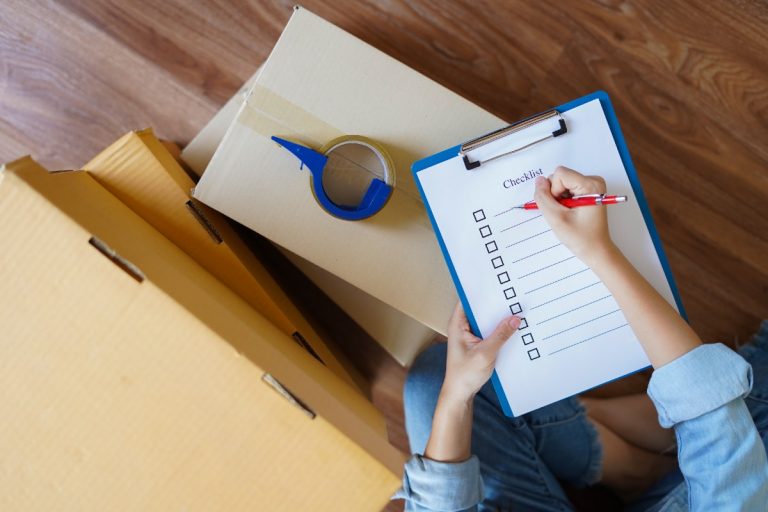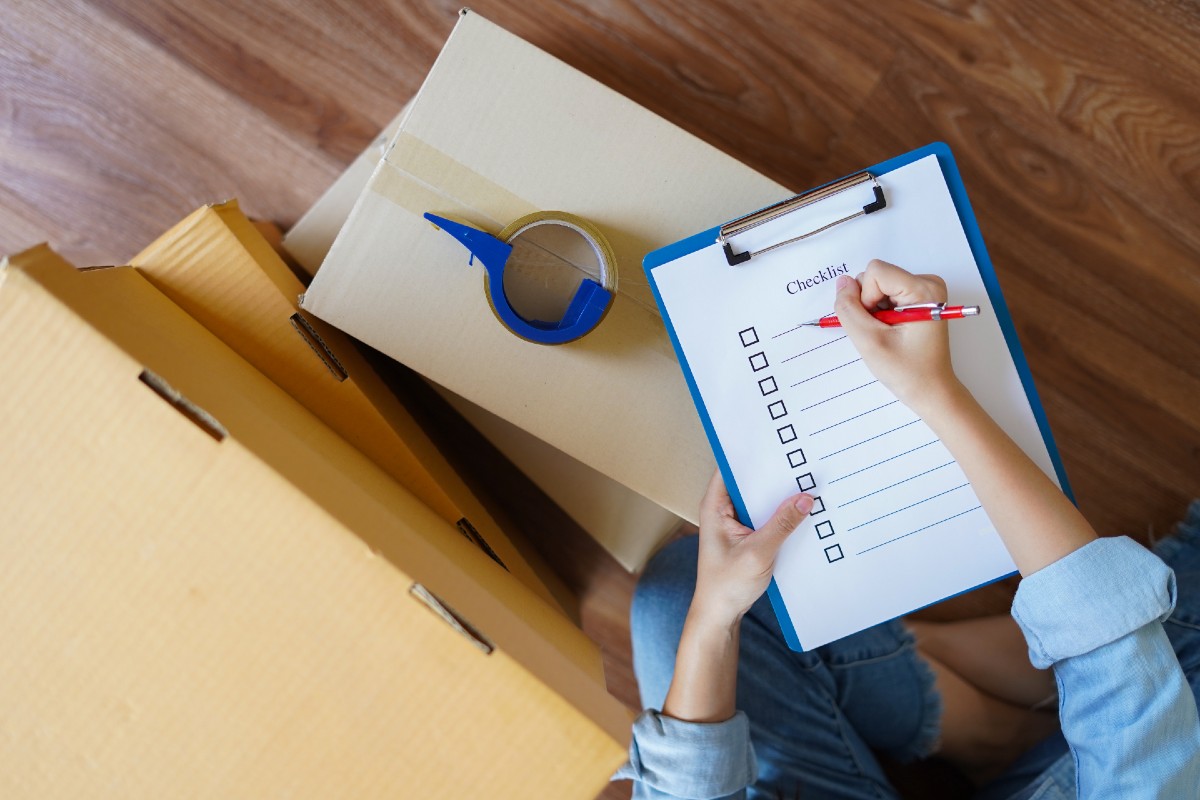
It’s important to have a moving checklist and these steps will help you create the perfect one for your needs.
Moving Checklist -Two Months before the move
• Prepare a budget spreadsheet to keep track of expenses.
• Research moving companies.
• Visit your new community, by visiting, you get a better idea for the neighborhoods and amenities.
• Book a Mover — The earlier you get a quote, the better chances you’ll get the date you want
• Get Insured — Confirm that your movers are insured.
• Research schools — Make sure they’re all set up with their new school and have a start date.
• Prepare A Moving Plan For Special Items — (e.g. fragile stuff, pianos, hot tub, etc.).
• Make a list of questions to ask the moving company
• Take Inventory Of Valuables — Start an inventory sheet for valuables before you move.
• Declutter your house
• Streamline Your Closet — Turn the hangers in your closet around. If you find you haven’t worn certain items donate those items.
One Month Before Your Move - Moving Checklist
• Go to your children’s school and arrange for their records to be transferred to their new school district.
• Use it or Lose it — Start using up things that you don’t want to move
• Have a garage sale.
• Donate the rest.
• Take Measurements — Check room dimensions at your new place, if possible, and make sure larger pieces of furniture will fit through the door.
• Take Inventory Of Electronics — Take inventory of all electronics and take a photo of the setup (it’s easier when you can see how they used to look when hooking them back up).
• Order Supplies — Unless we are packing you ourselves it is time to order boxes and other supplies such as tape, bubble wrap, and permanent markers.
• Painters and Repairmen — If you’re thinking about repainting your new digs, try to give yourself a few days before you have to be out of your old place as you’ll need drying time. Also, minor repairs are usually easier with out furniture in the way.
• Service Your Vehicle — If you’re moving a couple of hours away or longer, have your vehicles serviced.
• Create A Packing Schedule — Plan your packing schedule to get organized and start labelling boxes or areas of your home. Color Coding or numbering for each room can help.
• Book Storage — If you are planning on going into a storage unit now would be a good time to arrange for that.
• Check on Auto Insurance and Homeowners Insurance.
• Decide if you are taking your appliances.
• Cancel or update local memberships like the gym.
• Dispose of hazardous items that you can’t take with you.
• Confirm date
Three Weeks Before Your Move
• Do a Change of Address — Go to your local post office and fill out a change-of-address form. In most cases you can even do it online.
• Notify Friends and Family — Send a change of address postcard or email to all your friends and families with your new address!
• Notify Other Important Parties — Alert the following of your move: banks, credit cards, insurance, and utility companies and cable companies!
• Forward Medical Records — Arrange for medical records to be sent to any new healthcare providers or obtain copies of them yourself.
• Board Pets/Arrange for Babysitter, it can make things easier and less stressful.
• Confirm Parking at both locations for moving day.
• Gather All Important Documents In One Place — This includes financial statements, legal papers, passports, birth certificates, and more.
• Decide what to do with plants.
• Book Your Cleaners — Find and book a cleaner if you plan to use a professional service for your move-out or move-in.
Two Weeks Before Your Move
• Begin Packing — Start packing the things that you use most infrequently. While packing, note items of special value that may require special care.
• Pack An Essentials Bag (or Box) — Leave items out for an essentials box with everything you’ll need for your first 24 hours in your new home.
• Back-Up Your Computer — Make sure everything important is saved somewhere on a hard drive or in the cloud.
• Pack Your Valuables In A Safe Box — Use your inventory list for valuables that include items such as jewelry, expensive purses, small but precious family heirlooms, moon rocks, important files, or any other small valuables into a safe box (or boxes) that you will personally transport to your new home.
• Get Antiques Appraised — If you have antiques or valuables being moved, have them appraised and advise your moving company in case extra insurance is required.
• Label Everything — clearly label and number each box with its contents, if it is fragile or not, and the room it’s destined for. These markings should be on both the top and at least one side so you can tell what is in them even if the boxes are stacked. Consider color-coding box labels, i.e. orange = kitchen, blue = bathroom.
• Fix Minor Repairs — Take care of any minor repairs that need to be done before you move.
• Order new furniture or decor than you may need.
Moving Checklist for the Last Few Days Before Your Move
• Defrost The Freezer — If your freezer is moving with you, make sure to empty, clean, and defrost it at least 24 hours before moving day.
• Empty Your Refrigerator — The refrigerator needs to be emptied but, unless you are moving into storage or something, you can unload it at the last minute into coolers. We can put it on the truck last so it comes off first and you can get those food items back into the refrigerator as soon as possible.
• Plan for the Payment — If you haven’t already arranged to pay your mover with a credit card then make sure to cash for payment and tip (we don’t accept checks). A typical tip is 10% to 20% like most service industries. If you are moving out of town and plan on paying with a credit card it is a good idea to alert your credit card company that you will have a new charge coming through in a different zip code than normal. Sometimes card payments will be denied for security reasons if they are not alerted beforehand.
• Be Ready for the Cable and Internet Installer — Keep your tv, power cord and internet modem handy on move day (include it with the first load so it is accessible right away) if you are having cable and internet set up on move day.
• Dust Furniture and Vacuum Rugs — Ideally you would like to keep the dust and dirt at your old place and not bring it to the new one. You can wait until moving day to hit those rugs since the movers will obviously move the items on top of the rugs for you.
• Dispose Of Dangerous Liquids — Recycle or dispose of corrosives, flammables, and poisonous items.
• Empty Your Tanks — Empty oil and gas from grills, heaters, lawnmowers, and snow blowers.
• Clean Outdoor Furniture — Clean outdoor furniture BEFORE it’s moved.
• Book Your Final Walkthrough — Prepare and book for your final walkthrough with your landlord (if you’re renting or in an apartment).
On Moving Day - Checklist
• Have water bottles on hand.
• Take inventory of all belongings so you can keep track of what you have and what the movers are transporting. It may be helpful to take photos of fragile items.
• Get Up Early — Avoid sleeping in, it never hurts to have extra time on moving day!
• Prepare A Meal or Get Take Out — To avoid a full fridge, prepare or grab take-out breakfast, especially if you’ve packed everything.
• Be Ready To Move — Don’t keep your movers waiting, the sooner we’re all ready, the quicker (and smoother) the move will be.
• Protect Your Property — Layout protective equipment for flooring and doors if your mover won’t supply it.
• Start Cleaning — If you have help, have someone at the other home to start cleaning (but keep room for the movers).
• Final Walkthrough — Do a final walk-through to make sure you haven’t forgotten anything. Double-check those high-up closet shelves, and take a peek on top of the fridge and kitchen cabinets!
Moving Checklist for A Few Days After Moving Day
• Clean the new house.
• Begin to Unpack — Hang pictures, reload cabinets, etc.
• Check All Safety Features — Check to see that all of the carbon monoxide and smoke detectors in your new home have fresh batteries in them. Make sure that all the fire extinguishers are not expired and check any other safety devices to see if they are functioning properly.
• Have all of the locks for the house changed, because you never know how many of the previous owner’s friends and family had keys to your house. It is also a good idea to have the codes for the garage door opener changed.
• Map Out the Area — One of the first things you need to do is to find the location of the nearest hospital. You never know when you or someone you love will need emergency medical attention.
• Get To Know Your New Home — Locate the water shutoff switches, as well as the main circuit breaker (label the switches if not already labelled). Also, a good time to check your air filters!
• Review Your New HOA Rules
• Explore the neighborhood.
• Meet Your Neighbors
• Figure out trash pickup days.
• Update drivers license
• Register to vote
• Register your pet
• Relax…


